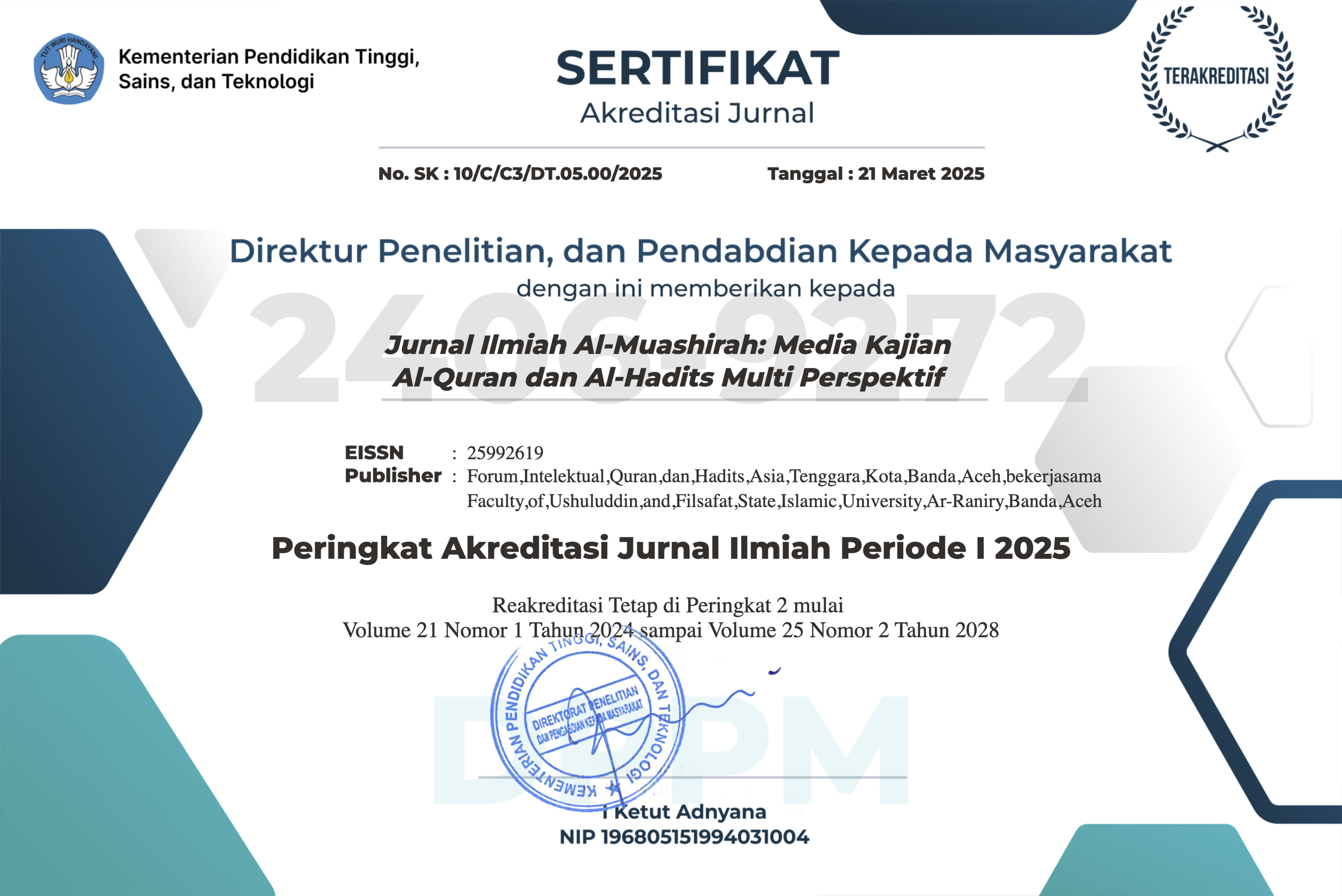Tradisi Hafalan Al-Qur’an Di Yogyakarta Perspektif Sosiologi Pengetahuan (Kajian Living Qur’an)
DOI:
https://doi.org/10.22373/jim.v17i1.7909Keywords:
Memorizing, al-Qur'an, Pon-Pes Krapyak, TheoryAbstract
The process of safeguarding the Koran at the time of the Prophet Muhammad with memorization was formed from a strong oral tradition among the Arab community at that time, apart from that some studies also found that the written tradition at that time was not too developed, because few friends were involved in the process of writing al -The Qur'an from the time of the Prophet Muhammad to the time of the four Khulafaur Rashidun can be used as an indication that not many friends are able to write well. Recent research after the discovery of the manuscript of the Koran in the Great Mosque of San'a which turned out to be a lot of palimsests also contributed to the argument that the late writing tradition developed at that time. Based on this horizon, preassure for memorization becomes natural for Muslims at this time. In this article, we will discuss al-Qur'an memorization at Pon-Pes al-munawair Huffadz I, which was applied in the past and is transmitted for the present era.
Downloads
References
A‘zami, Muhammad Mustafa. The History Of The Qur‟anic Text. Terj, Sohirin
Solihin dkk. Jakarta; Gema Insani Press, 2005.
Al-Utsaimin, Muhammad bin Shalih. Ushulun Fii Tafsir. Terj. Ummu Saniyyah. Solo; Al-Qowam, 2014.
Amin, Arwani. Mambaul Barakat fi Ilmil Qiraa‟at Juz 1. Kudus; Maktabah
Mubarak, 1997.
Creswell, John W. Penelitian Kualitatif & Desain Riset: Memilih di antara Lima Pendekatan, terj. Ahmad Lintang Lazuardi. Yogyakarta: Pustaka Pelajar,2015.
Haikal, Muhammad Husain. Umar bin Khattab. Terj, Ali Audah. Cet-12. Bogor: Pustaka Litera AntarNusa, 2011
Khaldun, Ibnu. Muqadimah. Terj, Masturi Ilham, Malik Supar, dkk. Pustaka AlKausar;Jakarta,2015.
Lester, Toby, "What Is The Koran" dalam The Atlantic Montlhy. 1999.
Manheim, Karl, Ideologi Dan Utopia: Menyingkap Kaitan Pikiran Dan Politik, Terj. Budi Hardiman Yogyakarta: Penerbit Kanisius, 1991.
Mattson, Ingrid. Ulumul Quran Zaman Kita. terj. R. Cecep Lukman Yasin.
Jakarta: Zaman, 2013.
Mustaqim,Abdul. Seminar Penelitian Living al-Qur`an (Power Point),
disampaikan dalam Seminar di STAIN Pekalongan tanggal 1 Desember
Qattan, Manna Khalil. Studi Ilmu-Ilmu Al-Qur‟an. Terj, Mudzakir, cet-16.
Pustaka Litera AntarNusa; Jakarta, 2013.
Saeed, Abdullah. Pemikiran Islam. Terj, tim penerjemah baitul hikmah, ed.
Sahiron Syamsuddin, M. Nur Prabowo S. Baitul Hikmah Press; Yogyakarta, 2014.
Syanin, Abdul Shabur. Saat Al-Quran Butuh Pembelaan. Terj, Khoirul Amru Harahap.Akhmad Faozan. Penerbit Erlangga; Jakarta, 2005.
Zarqani, Muhammad Abdul Adzim. Manahil Al-„Urfan Fi Ulum Al-Quran: Buku1. Terj. Qadirun Nur, Ahmad Musyafiq. Gaya Media Pratama; Jakarta,2001
Downloads
Published
Issue
Section
License
Authors who publish in Jurnal Ilmiah Al-Mu'ashirah agree to the following terms:
- Authors retain copyright and grant the journal right of first publication with the work simultaneously licensed under a Attribution-ShareAlike 4.0 International (CC BY-SA 4.0) License that allows others to share the work with an acknowledgment of the work's authorship and initial publication in this journal.
- Authors are able to enter into separate, additional contractual arrangements for the non-exclusive distribution of the journal's published version of the work (e.g., post it to an institutional repository or publish it in a book), with an acknowledgment of its initial publication in this journal.
- Authors are permitted and encouraged to post their work online (e.g., in institutional repositories or on their website) prior to and during the submission process, as it can lead to productive exchanges, as well as earlier and greater citation of published work (See The Effect of Open Access).













